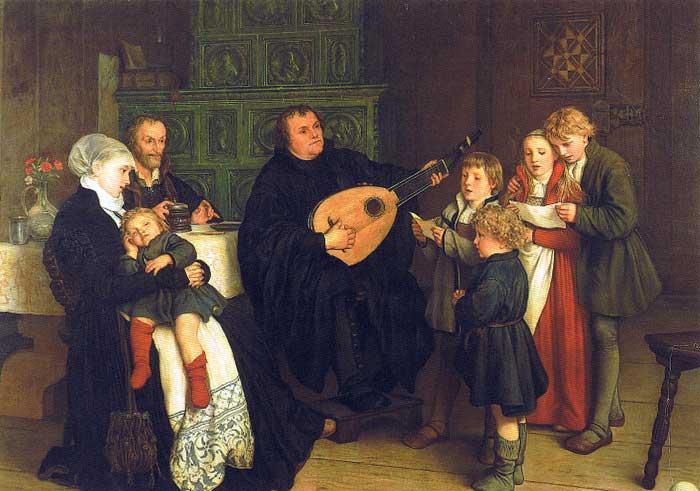Catechesis in Lutheran Traditions
Luther wrote a Small and Large Catechism, the first is a catechism proper, in question-and-answer format, designed for parents and pastors to use especially for instructing children; the second, the Large Catechism, is actually a set of lectures on the Catechism, and so is much lengthier. Below you'll find links and brief descriptions of these two texts, along with additional resources, and of course, a few tasty quotes from the man himself.
Luther’s Small Catechism
Luther's Small Catechism was published in 1529 in response to his journeys through the villages and towns of Germany. What he found there was not to his liking—the common people, as well as the pastors, had no knowledge of doctrine, and couldn't recite the Lord's Prayer, the Creed, or the Ten Commandments. So he set about writing the Small Catechism, set as a dialogue between Father and Son. The catechism form was not completely novel to him, but his was likely the most influential, becoming the standard from which others would align or depart.
“The deplorable, miserable condition which I discovered lately when I, too, was a visitor, has forced and urged me to prepare [publish] this Catechism, or Christian doctrine, in this small, plain, simple form. Mercy! Good God! what manifold misery I beheld! The common people, especially in the villages, have no knowledge whatever of Christian doctrine, and, alas! many pastors are altogether incapable and incompetent to teach [so much so, that one is ashamed to speak of it]. Nevertheless, all maintain that they are Christians, have been baptized and receive the [common] holy Sacraments. Yet they [do not understand and] cannot [even] recite either the Lord’s Prayer, or the Creed, or the Ten Commandments; they live like dumb brutes and irrational hogs; and yet, now that the Gospel has come, they have nicely learned to abuse all liberty like experts.”
Luther’s Large Catechism
Luther's Large Catechism, actually a series of lectures on the Catechism, and sometimes called The German Catechism, was written for children still, but also has in mind a more educated audience. If the common folk were too ignorant, the nobility were too prideful, thinking that once they'd read the catechism, they could move on to more interesting things. Rather, Luther aspired to always remain "a child and pupil of the Catechism," spending time daily in its recitation and memorization. We ought not "to become doctors too soon," Luther warns, but must always remain as children who draw strength against the devil's wiles by always returning to the basic teachings of the faith.
“Therefore I again implore all Christians, especially pastors and preachers, not to be doctors too soon, and imagine that they know everything ... but that they daily exercise themselves well in these studies and constantly treat them; moreover, that they guard with all care and diligence against the poisonous infection of such security and vain imagination, but steadily keep on reading, teaching, learning, pondering, and meditating, and do not cease until they have made a test and are sure that they have taught the devil to death, and have become more learned than God Himself and all His saints.”
Resources on Lutheran Catechesis
Both the Small and Large Catechisms, along with other key Lutheran texts, can be found in Robert Kolb and Timothy Wengert, eds. The Book of Concord: The Confessions of the Evangelical Lutheran Church (Fortress Press, 2000).
Other secondary sources include:
Charles P. Arand, That I May Be His Own: An Overview of Luther’s Catechisms (Concordia Publishing House, 2000).
Timothy Wengert, Martin Luther’s Catechisms: Forming the Faith (Minneapolis: Fortress Press, 2009).
Friedemann Hebart, “The Role of the Lord’s Prayer in Luther’s Theology of Prayer,” Lutheran Theological Journal 18 (May 1984): 6–17
Luther’s Catechisms—450 Years: Essays Commemorating the Small and Large Catechisms of Dr. Martin Luther, 18–27 (Fort Wayne: Concordia Theological Seminary Press, 1979
Robert Kolb and Charles P. Arand, The Genius of Luther’s Theology: A Wittenberg Way of Thinking for the Contemporary Church (Grand Rapids: Baker, 2008).
Gottfried Krodel, “Luther’s Work on the Catechism in the Context of Late Medieval Catechetical Literature,” Concordia Journal 25 (1999): 364–404.
Todd Hains, Martin Luther and the Rule of Faith: Reading God’s Word for God’s People (Downers Grove, IL: IVP Academic, 2022).
Training Centers
Concordia Catechetical Academy (Peace Lutheran Church - Sussex, Wisconsin)
“Welcome to Christ” Series
Welcome to Christ: Lutheran Rites for the Catechumenate (Minneapolis: Augsburg Fortress, 1997)
Welcome to Christ: A Lutheran Introduction to the Catechumenate (Minneapolis: Augsburg Fortress, 1997)
Welcome to Christ: A Lutheran Catechetical Guide (Minneapolis: Augsburg Fortress, 1997)
Welcome to Christ: preparing Adults for Baptism and Discipleship, Videotape (Minneapolis: Augsburg Fortress, 1998)
Welcome to Christ: A Sponsor’s Guide (Minneapolis: Augsburg Fortress, 2002).
* A more complete list can be found at the Bibliography page for the Medieval/Reformation sources


